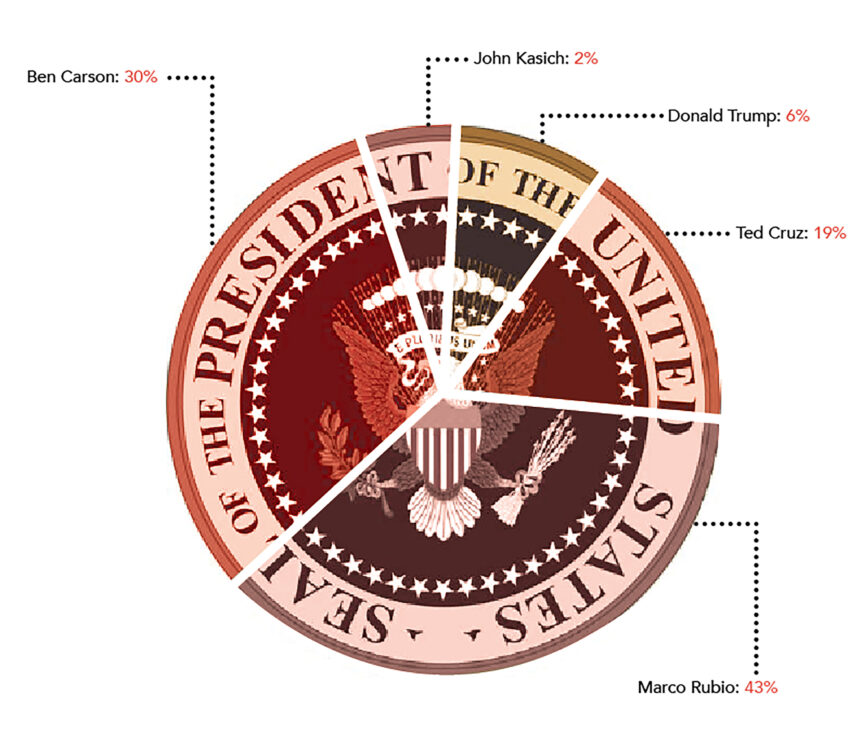On Super Tuesday, Sen. Marco Rubio, R-Fla. swept a campus-wide straw poll, taking 43 percent of the vote.
The Collegian poll collected preferences of 668 respondents in the Republican Presidential Primary ahead of the Super Tuesday primary returns.
Preferences of Hillsdale students do not correlate with the results of the 11-state primary block: Rubio won his first and only victory so far in Minnesota on Tuesday evening.
Ben Carson, who earned the least number of delegates during the state primaries, claimed 38 percent of the straw poll with 202 votes.
Sen. Ted Cruz, R-Tex., who took 19 percent with 125 votes in the campus straw poll, came second on Tuesday with primary victories in three states.
Donald Trump, Super Tuesday’s champion, took seven states, yet placed fourth in the campus straw poll with only 38 votes.
Gov. John Kasich, R-Ohio—who hasn’t won any states—came in last in the straw poll, earning only 14 votes.
Hillsdale College Politics Department faculty generally agreed Trump was the clear winner and that this victory will make him the GOP nominee.
“I wasn’t surprised. It fit pretty closely to what I expected,” said Associate Professor of Politics John Grant. “It was a victory for Trump, and barring some scandal, I think he will win the nomination.”
Cruz, according to Grant, could have performed better, and the lack of a clear majority victory in Texas may hurt him down the line. He believes Carson and Kasich are likely searching for a spot in the new administration, especially considering their poor performance last Tuesday.
“Neither is doing well enough for VP though, and Kasich hasn’t come close in any state,” Grant said.
Politics Department Chair Mickey Craig had more optimism for Cruz and Rubio, believing their victories in Oklahoma and Alaska and Minnesota, respectively, were upsets considering their closed primary system.
“In states with open primaries, Trump is bringing in poor, working class whites disaffected with elites in both parties,” Craig said. “Trump persuades people irritated in 2012 and 2008—the turnout numbers have skyrocketed in the GOP but no so much in the DNC.”
This year, for example, more people voted for Trump in Nevada than did in the state in 2012. Grant added that Cruz and Trump are the two people voters angry at the establishment are choosing, a big part of their campaigns and a reason why they Craig says they should come together.
As for Carson, Craig says the retired neurosurgeon should have tried his luck at a Massachusetts Senate run, especially considering the retirement of Sen. Barbara Mikulski, D-Mass.
“I don’t know what he expects to happen. He didn’t break in in the way he thought he would,” Craig said.
Craig sees Kasich’s resilience as based around his relationship to Ohio, where he is governor. Since no GOP candidate for president has won the general election without Ohio, Kasich believes his good originates there.
“Every person running sincerely believes they would be best or at least do something good,” Craig said. “Kasich doesn’t like what he sees, and thinks he could be viable in helping anyone win Ohio.”
Craig believes there is a high possibility of a third-party run by a strong social conservative. Even though he admits there is no chance of an independent victory, he believes it could happen, although he doubts any of the current GOP candidates would be that third-party candidate.
Professor of Politics Adam Carrington agrees Trump is the frontrunner, but thinks his victory is not as decisive as many have said, especially considering he only took seven states when most thought he would take 12.
“At the same time, though, Trump did win a clear majority and has no chance of being beaten,” Carrington said. “Cruz has a chance, if he becomes a single factor, and both he and Rubio have reasonable arguments for staying in.”
Carrington believes Cruz performed as was expected but that Rubio was not relatively supposed to do well. For Kasich and Carson, however, a presidential run seems optimistic.
“Kasich’s strategy is to become a king-maker, since the convention is in his home state,” Carrington said. “But I’m not sure why Carson is staying in.”
On the Democratic side, Hillary Clinton swept with seven states and 504 delegates, compared to Sen. Bernie Sanders’, I-Vt., four and 340. Carrington agreed that Clinton is the clear frontrunner, so in order for Sanders to overcome Clinton, he must begin to heat up his campaign.
“Bernie would have to go negative. He hasn’t been willing to take off the gloves—he could merit from bringing up her past issues if he keeps losing how he has been losing,” Carrington said.
Carrington compared Sanders to Barry Goldwater, in that both tried to remake their party in the face of a time of great change. He said the current race is a battle for the future of the GOP and the core of the DNC.
Grant acknowledged the ‘huge advantage’ of Clinton, but added that he believes the democratic primary to be inherently flawed, considering their system of the superdelegate process. He also questioned the likelihood of a Clinton presidency, given her legal troubles.
“If it were only the election, Sanders is out, but Clinton could be indicted,” Grant said. “Sanders is popular because he’s an outsider, reaffirming the Democratic policies.”
Grant believes the Democratic party is not aiming for full-fledged socialism, and that Sanders represents a popularization of left-wing beliefs.
Craig, however, is impressed that Sanders has managed to even come close to toppling Clinton.


